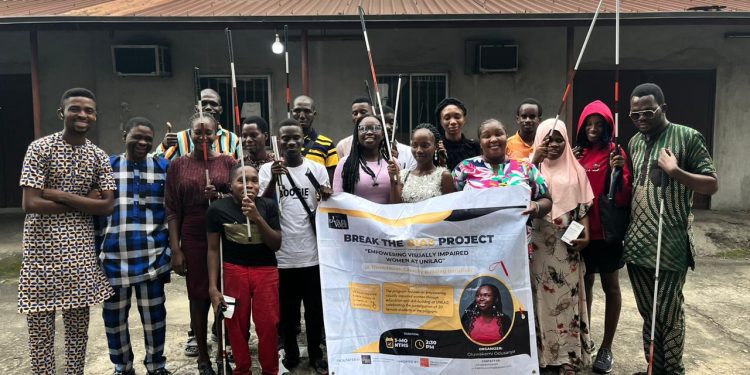Eagles Voice International for Disability Rights has empowered visually impaired students at the University of Lagos (UNILAG) on computer competency, communication and leadership skills, orientation and mobility skills.
The three-month capacity-building programme, themed “Breaking the Bias,” which took place virtually and physically, was supported by the Pollination Project.
The training was designed to enhance independent living for visually impaired students by equipping them with diverse skills such as Microsoft office packages, internet surveys and software that will enable them to do research independently.
The convener of Eagles Voice International for Disability Rights, Oluwakemi Odusanya shared that the training was primarily targeted at the blind and partially sighted women to learn basic skills that will make them attain active leadership positions even within their immediate community.
She however noted that there were limited female applicants and the scope of the project was expanded to incorporate male students.
While explaining the reason for the low participation of female blind students, Odusanya said “it’s because visually impaired female students are not self-sufficient and lack information, they didn’t know better and I believe after now, when we call out for another application, the number will increase.”
She also used this medium to call on parents of children with disabilities to push them out to go to the world and not limit them.
“Let them exercise their rights as humans, enjoy the benefit of education, communication and meeting other persons. This will also boost their self-morale,” she said.
While sharing the next step of action, Odusanya said “we want to expand this scope to other states and also use this as a channel for training leaders of leaders.” She then called on religious and community leaders, “not to shy away from the need of a girl child”, “a female doesn’t make you look less, or not having the right skill,”
In his goodwill message, Chairman of the Lagos State Chapter of the Nigeria Association of the Blind (NAB), Barrister Abolarinwa Salami stated that more often than not Blind students are left on their own to look for ways to catch up with their colleagues because there are no special equipments made available to them, even lecturers don’t have the appropriate orientation or the needed technique to carry this group of learners along in the class.
As a key player in the disability community in Lagos, he advocated for disability-inclusive departments in every university that will address the need and welfare of this group of learners and should be manned by experts in special education and disability affairs.
He also suggested training for lecturers who are not specialists so that they have a kind of fair knowledge of how to carry persons with disability along while they are in school.
According to an Assistive Tech consultant at Hollyha and a partner with Eagles Voice, Daniel Isaiah, “only one-third of the visually impaired students of UNILAG have a fair knowledge of the computer and screenreader.”
“It was mind-blowing to find out that students who are blind at the University of Lagos hardly have the I.C.T skill needed to strive in terms of their academics.”
Isaiah advised that whatever they’ve learnt during this training is not enough, they need to continue to practice because the world of I.C.T revolves so they need to build on their pace, get abreast with all the latest skills in terms of computers, with that they will be up and doing.
President of the National Association of Nigerian Visually Impaired Students (UNILAG), Felix Areo attested that “the training has helped students with visual impairment including himself to enhance their academic performance, while he urged students to always key into opportunities like this.”
A year one student of Library and Information Science, Mass Communication Department at UNILAG, Jessy Adepoju while appreciating the organisers for the skills and gifts, stated that the capacity-building has been impactful.
Speaking specifically about the mobility training, Adepoju said “it will make us a little bit independent, able to do things on our own without seeking help all the time while the voice recorder can be used in the classroom to record our lectures. I will be using the white cane as a means of my mobility and the voice recorder to record when necessary.”
All the beneficiaries received a white cane for their mobility and a voice recorder to record their lectures with permission and also record notes as this will help to retain lectures in their memory.

